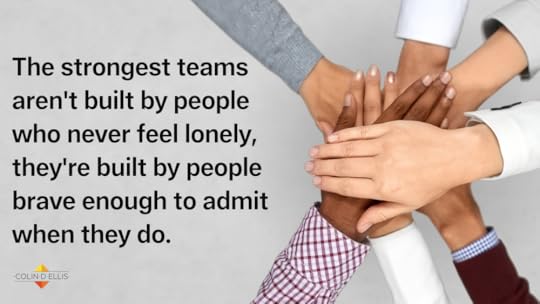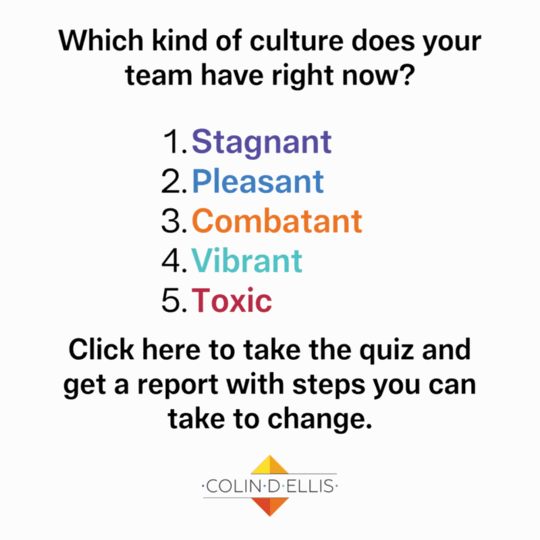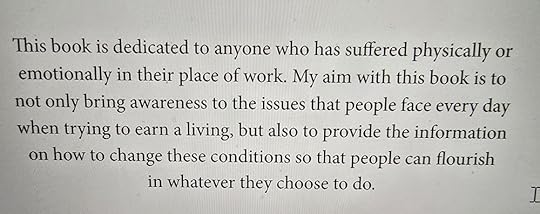Colin D. Ellis's Blog, page 11
June 16, 2025
Clickbait, picbait and our attention
One of the biggest challenges all working humans face today is how to manage their attention. Distraction is now at our fingertips and ‘multitasking’ is now an excuse for not being able to stay focused.
Social media platforms are still one of the best ways for those in business to educate themselves, with thousands of research articles, insightful articles and culture ideas being shared daily. If only we had the discipline to find and read them!
Think about your last attempt to read a substantial article online. How many times did you get distracted? How many notifications pulled you away? How long was it before you skipped to the end? There’s a good chance that you struggled to get through this article without your phone luring you into another dopamine-fuelled rabbit hole!
It’s not just you, it’s pretty much everyone. According to research our attention spans have plummeted from around 2½ minutes to around 45 seconds over the past two decades.
The technology platforms know this, of course. Social media algorithms are specifically designed to trigger dopamine responses through intermittent reinforcement, which is the same principle that makes gambling machines so addictive. They're not accidentally making us scroll mindlessly; they're exceptionally good at it.
Which means that it’s up to you to be discerning when it comes to the content you ‘consume’ in your feed as essentially it becomes self-reinforcing, like digital fast food. It tastes good at that moment, but does nothing to nourish you in the medium to long-term and the chance for real education is lost.
Think about your LinkedIn feed for a moment. How much of what you're consuming actually makes you better at your job? How much genuinely challenges your thinking or teaches you something useful? I'm willing to bet that most of it falls into two categories:
Clickbait - headlines that immediately resonate as they confirm what you already believe; or what I like to call
Picbait - those motivational quotes plastered over sunset photos that make you feel momentarily inspired before you forget them entirely.
The more that we ‘like’ clickbait and picbait, the more of it will be presented to us and you’ll end up in a never-ending ‘scroll-like-scroll-like-scroll-like’ doom loop.
Yet this does nothing to serve the ‘future you’. Our attention is a limited cognitive resource that depletes throughout the day. If you're spending your prime mental hours scrolling through content that doesn't add value to you, you're essentially giving away your most precious resource for free.
Instead of passively consuming whatever the algorithm serves up, become an active curator of your own learning. Seek out content that genuinely challenges your assumptions. Follow people who you disagree with intelligently. Read articles that make you think rather than just nod along.
I've started applying a simple test to everything I consume: "Will this make me better at what I do, or will this challenge how I think?" If the answer is no to both, I move on. It's amazing how much time this frees up for actually useful learning. It also has the secondary effect of ‘cleaning up’ my feed to present me with more of the content that I’m looking for, especially on LinkedIn.
This habit change can also influence how we work together too. Teams that build cultures of deep focus and intentional learning consistently outperform those that operate in constant distraction mode.
The good news is that we all have agency over how we choose to direct our attention. Start small. Pick one source of genuinely valuable content each day. Read it properly. Think about it. Maybe even discuss it or share it with a colleague without immediately moving on to the next thing. You could start with this one!
Your future self will thank you for treating your attention like the finite, valuable resource it actually is. Because in a world full of distractions, the ability to focus deeply will become a competitive advantage.
You made it to the end, well done! And thank you, I hope it has given you something to think about.
Subscribe to Colin on Culture Sign up with your email * indicates required Email Address *June 15, 2025
Restructures change people, not culture
Despite what you may read in company emails about upcoming changes and the rationale behind them, restructures do not change culture. In fact, in many circumstances, they make it worse - generating uncertainty and fear and setting progress back for months whilst employees try to understand how the changes affect them.
Restructures (see also: Operating Model Changes and Transformation Projects) are often used as levers by senior management who are seeking to bring about a change in financial or operational conditions - usually to either make more money or to save more money.
Of course, this is entirely normal and justifiable (in most cases, at least). However, suggesting that changing people’s job titles, moving their reporting lines or removing some people altogether will change the culture is false.
The only way to change a culture (and also achieve the results you are looking for) is to rid yourselves of the people whose behaviours or performance hold it back, train managers on how to build and evolve it, then give employees agency over how the things they need to change to ensure that it’s something they’re proud to be part of.
You don’t need to restructure the business to achieve this.
Subscribe to Colin on Culture Sign up with your email * indicates required Email Address *June 12, 2025
The Loneliness Paradox

I was working with a HR Manager last week to agree on the content for a Human Skills for Leaders programme that I’m running (more details here) and we got talking about loneliness.
She said that it was a topic that came up time and again in their place of work for all employees (regardless of where they worked), but that they hadn’t developed a good way of talking about it. They’re not alone.
When was the last time you talked about loneliness at your place of work? Even writing about it feels taboo! However, the evidence around loneliness is stark.
Research from Gallup last year revealed that one in five employees worldwide experience loneliness. The Surgeon General of the United States, Dr. Vivek Murthy, declared loneliness “a lethal pandemic” and compared it to smoking 15 cigarettes a day.
Boston Consulting Group's 2024 research shows psychological safety functions as an equaliser, which is particularly effective for diverse (gender, race, location) employee groups. The very thing we're afraid to discuss is the thing that drives our best people away.
This was reinforced by recent Japanese research which found a direct correlation between workplace loneliness and job turnover within six months.
Finally, research from Cigna found that three in five adults reported feelings of loneliness, which typically spills over into stress, anxiety, and depression, which are all still emotions that we feel shame in talking about or else are passed off by management as a ‘bad day’ or that people just ‘need to get their head in the game.’
For years we’ve treated loneliness like professional kryptonite; where being vulnerable about how you feel equates to weakness, and admitting loneliness feels like career suicide. Whilst it’s fair to say that it’s been exacerbated by the pandemic, the signs were there prior to it.
However here’s the paradox, the teams that perform the best aren't populated by emotional robots, they're filled with people who can say “I'm struggling with connection” or “I miss being around people” without fear of judgment.
Gallup found that employees who feel a sense of connection to each other and to the organisation that they work for (i.e. one that recognises vulnerability as a human trait that everyone has) are 64% less likely to experience loneliness than their disengaged counterparts.
These organisations prioritise meaningful connection. They don’t talk about being ‘one team’ for the purposes of results only or performative culture, they talk about it in the sense of ‘we are together as people and our humanity is our strength, not a weakness to be hidden.’
They understand that loneliness isn't a character flaw, it's an opportunity. When someone says they ‘not feeling themselves’ or they ‘feel disconnected’ there’s no judgement. Team mates recognise that psychological safety lessens feelings of loneliness and fulfils the need for belonging by rallying around each other using empathy and compassion.
These are basic human needs; not only to help us to refocus, but also to help us feel heard and understood.
As the research shows, leaders who think this humanity undermines results are wrong. The strongest teams aren't built by people who never feel lonely, they're built by people brave enough to admit when they do.
Subscribe to Colin on Culture Sign up with your email * indicates required Email Address *June 11, 2025
High-performance is not over-working
High performance isn't about working harder, it's about working smarter with intention and energy. Over-working is the enemy of excellence, creating exhausted individuals and teams who confuse busyness with productivity.
True high performers understand recovery as a performance strategy. They set boundaries, prioritise ruthlessly, and protect their cognitive resources for what matters most. Over-workers, meanwhile, mistake stress for success and hours logged for value created.
High performers ask "What's the value or impact?" whilst over-workers ask "What's next on the list?"
Leaders who can't distinguish between the two will burn out their best people whilst rewarding their busiest and therefore undermine any possibility of high-performance.
Subscribe to Colin on Culture Sign up with your email * indicates required Email Address *June 10, 2025
Engagement is a two-way street
Engagement is a much maligned word in the world of culture, largely as a result of the ‘engagement survey’ (which I wrote about recently - you can read it here).
This is typically an annual event where information is gathered from employees which leaders then spend an inordinate amount of time deciding how to address, before not doing anything at all (according to Gallup, only 8% of organisations take meaningful action on surveys)
However, there is another issue that’s often at play and that is, that the assumption from many employees is that engagement i.e. how connected and motivated they feel to do their job every day is the sole responsibility of the organisation. This assumption is flawed (and it’s often difficult for people to hear/read!)
Engagement is an agreement between employee and organisation to work together to achieve something and as such is a mutual responsibility. In every management programme that I run, this is always a point that I emphasise to ensure that those responsible for leading people set an example - on personal engagement - for others to follow.
The engagement responsibilities are as follows.
Organisation:
A positive, safe culture
Tools to do the job (resources, technology, ‘work’ space)
Compensation to match responsibilities
Education to help to take on new responsibilities or tasks
Provide employees with agency over their work
Leaders and managers who understand how to get the best out of people
Have a vision that’s inspiring
Have a set of values that are meaningful rather than performative (i.e. no toleration of brilliant jerks)
Employees:
Have empathy for others
Be a team player
Have a growth mindset
Have a strong work ethic
Deliver on promises made
Look for ways to add value to the team/organisation
Develop existing skills
Educate themselves on future skills
Of course, when organisations hold up their end of the bargain, then it’s much easier for employees to do likewise. However, that doesn’t mean that employees should wait until they do. In my work with leadership teams across multiple industries I have found those with the highest engagement scores have always credited their employees with pushing them to be better and thus raising the level of engagement (and performance) for everyone.
The most engaged workforces emerge when both parties honour their commitments. The question isn't whether your organisation will hold up its end, the question is whether you'll step up regardless, becoming the catalyst that forces higher standards across your entire workplace.
Subscribe to Colin on Culture Sign up with your email * indicates required Email Address *June 9, 2025
The culture survey: fewer questions, more action
The culture or ‘engagement’ survey can be quite divisive. When done well it can provide organisations and their leaders with insights upon which they can immediately act on. When done badly it can actually make the culture worse!
Surveys are still the most popular way for companies to gauge culture and to uncover potential issues that need to be addressed. This was reinforced by Adam Grant, Scott Judd and Eric O’Rourke in a paper in 2018, but it’s only recently that they’ve been used consistently.
Management theories began shifting towards valuing employee satisfaction and motivation in the 1930s. The Human Relations Movement – born out of the Hawthorne studies in the 1920s – emphasised the importance of psychological and social factors in the workplace.
By the 1970s – and fuelled by The Quality of Working Life movement – employee surveys had become a staple in many of the large organisations and they focused largely on job satisfaction, communication and working conditions.
By the 2000s, technology had replaced the paper-based approach and simplified the process of gathering information and by the 2010s, workplaces started to introduce ‘Pulse’ surveys. Pulse surveys were a way of moving away from the once-a-year approach to provide richer data on culture and also to ensure that issues were being picked up sooner rather than later.
With advancements in artificial intelligence and data analytics, organisations are now exploring ways to use predictive models to anticipate employee needs, predict turnover and proactively address potential issues. Yet, any information collected or predicted is only as good as the action it initiates.
I spoke with an employee recently and asked whether she’d responded to the recent engagement survey that her organisation had undertaken. She rolled her eyes (never a good sign) and said that she had wasted 20 minutes(!) answering questions. Unfortunately, this is the lived experience of many employees.
Empathy seems to be rarely used when constructing surveys, particularly in the attention-poor world we live in today. Why ask five questions when you have a tool that can ask fifty? Because, employees are much more likely to answer five. It’s called ‘Response Burden’ and when the burden feels lighter we’re more likely to answer and answers are important if you want to improve.
The best surveys are those that are simple to understand, quick to complete and of course, are actioned by those who have accountability for employee experience.
Valuable productive time spent providing honest insights into what’s good and what’s not in order to produce a report that few people read or follow through on, in any meaningful way, is an appalling waste.
Leaders should be measured on their delivery to the culture actions by way of demonstrating to staff that their feedback has not been in vain, with the ultimate objective being that the culture improves in the short-term. Many organisations are still discussing the results from last year’s survey as they look to embark on this years.
The following principles should, therefore, be taken into consideration when using culture surveys:
Little and often – focus on fewer questions that provide easy-to-interpret information at more regular intervals throughout the year
Employee view – ask the questions from the perspective of the employee (‘Do you see our values being consistently practised by our leadership team?’) rather than the employer (‘Do you understand how to put the values into practice?’)
Don’t keep asking the same people – vary the people that you ask so that they don’t get survey fatigue
Create safety – give employees the option to provide their name if they wish to do so. They are less likely to do this in a toxic culture, hence why anonymity should be offered
Action immediately - don’t wait, assign owners, get to work and complete in the first three months
The culture/engagement/listening/other fancy name (delete as appropriate for your company) survey is still the best way to find out what people think about your culture, but if you want them to be seen as essential to positive evolution, then there needs to be fewer questions and more action.
 Subscribe to Colin on Culture Sign up with your email * indicates required Email Address *
Subscribe to Colin on Culture Sign up with your email * indicates required Email Address *
June 8, 2025
How to bust your bureaucracy!
According to research, over $3tn is wasted every year on excess bureaucracy ranging from simple process flaws to overly risk averse people and control freaks! In this video I not only talk about the issues that bureaucracy creates, but also provide a model to better understand how it arises and three actions you can take to stop it.
It is also available as a podcast, simply search for ‘Colin on Culture’ on your app of choice.
Video describing how to bust bureaucracy in workplace culture
Subscribe to Colin on Culture Sign up with your email * indicates required Email Address *June 5, 2025
No-one should fear going to work

Somebody asked me last week why I dedicated my book to people that have been adversely affected by their working conditions and my answer was short ‘because no-one should face the fear of going to work.’
Imagine a workplace where you feel safe, respected, and able to be your best self. Where people are polite, take an interest in you and talk to you in a way that you’d like to be spoken to. Most people reading this blog have to work in order to live and if we could choose our conditions, we’d be happy with these basic human interactions.
Sadly, for many, this isn't the reality, including you as you read this now. Data suggests one in four people dreads going to work, and far too many face environments that cause significant stress and anxiety.
At its worst, fear is a hallmark of a toxic culture. These cultures can lead to profound emotional and physical pain, contributing to stress, anxiety, depression, and tragically, even suicide. This shouldn't be the case. Work is where we spend a significant portion of our lives, and everyone deserves a respectful place to earn a living.
The good news is that toxic culture is not necessarily inevitable. These environments are not simply a matter of bad luck; they are often the result of a lack of understanding, insufficient investment in culture, and poor leadership. Ignoring the signs of toxicity will not make them disappear.
Workplaces should actively build psychological safety, creating conditions where people feel safe to contribute, challenge ideas, and speak up without fear of negative repercussions. Building relationships based on trust and fostering a sense of belonging are crucial elements.
Creating a workplace free from fear requires a conscious effort, after all, you get the culture that you choose to build. It means leaders must role model positive behaviours, address poor conduct swiftly, and prioritize the well-being of their employees. Organisations that invest time, thought, and money into deliberately building and evolving their culture are not only reducing the risk of toxicity but also creating environments where people feel cared for and can thrive.
This is the least you can do for the humans that work for you.
---
Don’t let the conditions for toxicity take root in your organisation. Find out how to manage the risk of it occurring in my new best-selling book ‘Detox Your Culture’. Get it here or wherever you buy your books.
Subscribe to Colin on Culture Sign up with your email * indicates required Email Address *June 4, 2025
AI and the Feynman Technique
I know many of you are tired of hearing and reading about it, but AI will change the way that we work. It’s not something to be ignored or feared, it’s something to be curious about and accepted.
Yet, whenever I ask anyone what they are doing to learn about AI, almost everyone says that they don’t know where to start in their understanding of it. It’s like blockchain in that the tech propaganda gets in the way of the learning. This is where the Feynman Technique comes in.
Brilliant physicist Richard Feynman had a special talent: he could explain the most complicated ideas in ways that anyone could understand. He believed that if you couldn't explain something simply, then you didn't really understand it yourself.
It’s a great way to educate yourself about something about which you may have no knowledge and a technique I’ve used myself over the years.
Here’s how it works.
Step 1: Pick your topic
Choose something you want to learn – maybe it's AI, photosynthesis, how planes fly, or how democracy works.
Step 2: Teach it to a ‘child’
Pretend you're explaining it to someone much younger than you, say, a 12-year old. Write it down or say it out loud using simple words. No jargon, no complex terms, just plain English.
Step 3: Find the gaps
When you get stuck or start using complicated words, you've found a gap in your understanding. That's brilliant, now you know exactly what you need to work on!
Step 4: Go back and learn more
Fill in those gaps by studying (reading/watching YouTube videos) more, then try explaining it again. Keep doing this until you can explain the whole thing clearly.
It works so well because your brain has to organise the information properly. It's like tidying your bedroom, you can't just shove everything under the bed and call it clean. You have to actually sort things out.
Plus, using simple language forces you to really understand the ideas. It's easy to memorise fancy terms and fool yourself into thinking you understand something. But when you have to explain why technology could change the way we work or why plants need sunlight using words a child would know, you quickly discover whether you actually get it…or not.
Students who use this technique often find they remember things much better in exams. Instead of just memorising facts, they've built a proper understanding that sticks around. Scientists and engineers use it too.
So next time you're learning something new, try the Feynman Technique. Pick a topic, explain it to your parent/partner/pet (they're all excellent listeners), and see where you get stuck. Then go back, learn more, and try again. And remember: if you can't explain it simply, you don't understand it well enough yet.
And yes, I did use the technique to write this blog!
Subscribe to Colin on Culture Sign up with your email * indicates required Email Address *June 3, 2025
Expectations of us and me
We work at our best when we understand what’s expected of the team that we’re part of and what’s expected of us as individuals.
Too often, managers will provide one and leave the other open to interpretation. This creates uncertainty or sometimes, in the case of teams, conflict as members struggle to understand who is doing what, and when.
When we understand what’s expected of us and of me, it not only generates greater collaboration and it also makes personal contribution easier to understand.
When team members understand both their individual contribution and how it fits into the larger team goals, they can make autonomous decisions that serve both their personal accountability and collective success. Which is something that every manager wants.
Subscribe to Colin on Culture Sign up with your email * indicates required Email Address *


